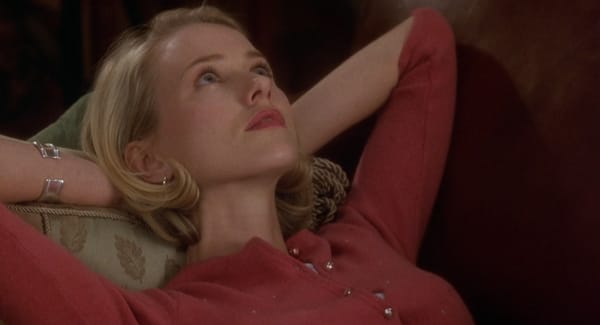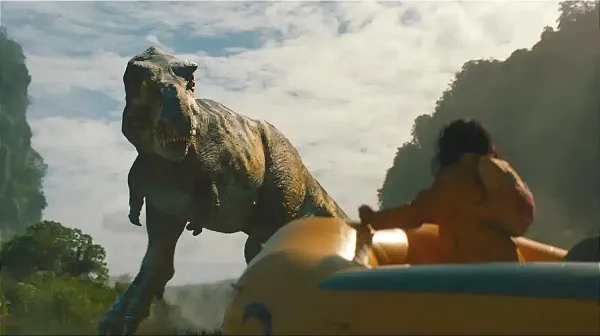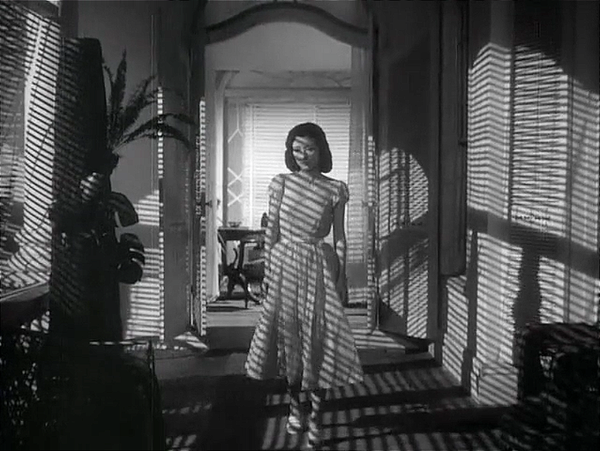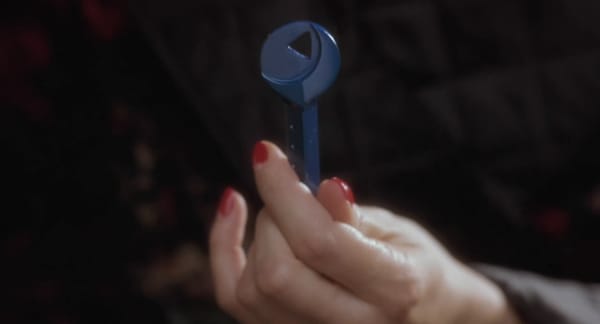What to Watch: Kink's Ransom
"Sanctuary" in theaters, "Daliland" on demand, the Compleat Ozu in Boston and New York.

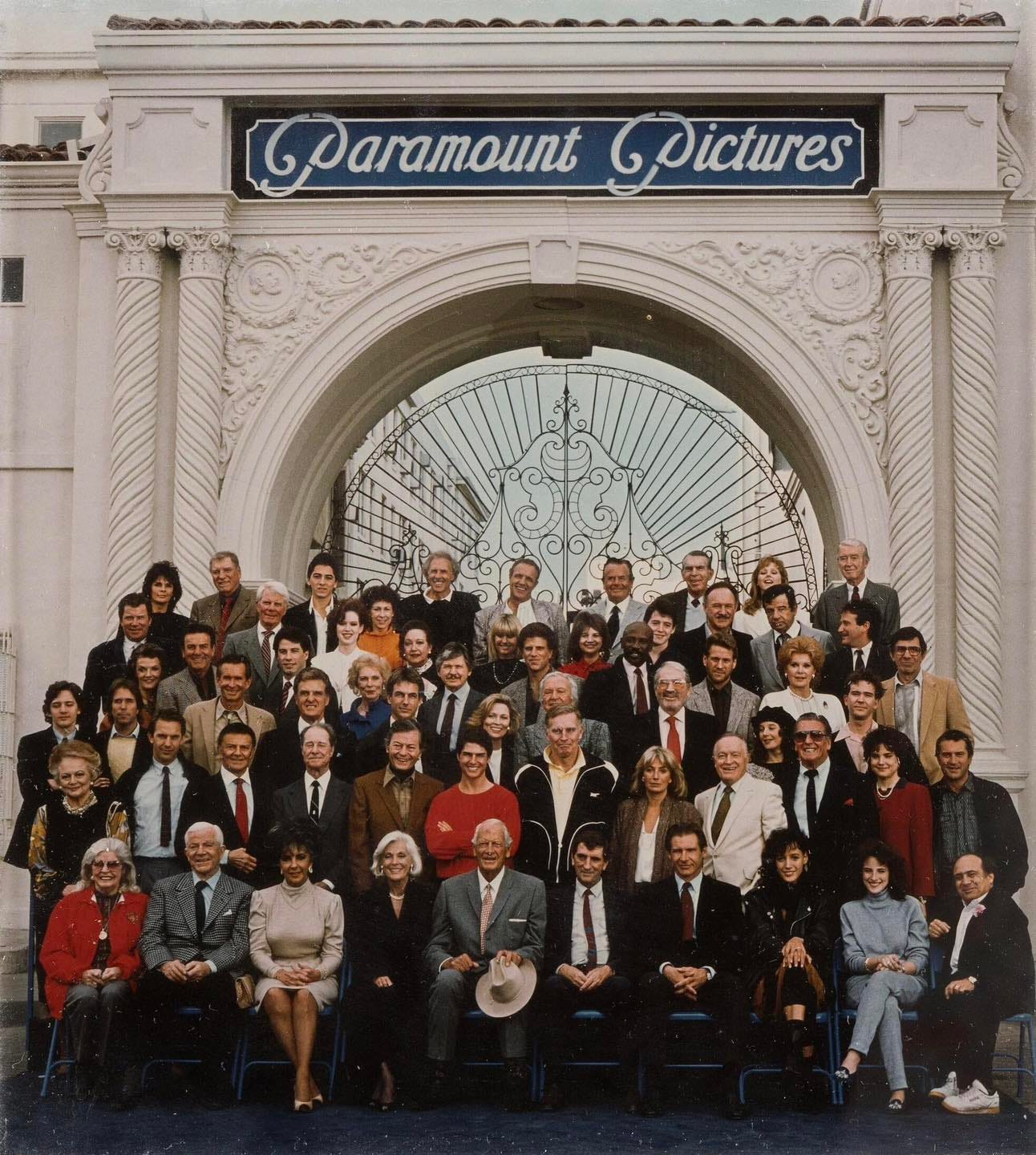
Happy Indictment Day to all those who celebrate.
This week has been a lot — good and bad, but a lot — and I sometimes think we use nostalgia as an escape hatch from the present into a temporary safe room of the past. So let’s start this post off with some 36-year-old whiplash — a kind of “Hollywood Squares” squared. An old photo resurfaced on Facebook this week: A 1987 group shot of movie stars gathered on the Paramount lot on the occasion of the studio’s 75th anniversary. It’s hardly an unknown image, but it’s been a long time since I’ve seen it or thought about it, and I’m always amazed at how putting icons of such different eras in the same moment of time and space induces pop-culture vertigo: Robert De Niro and Olivia de Havilland; Jimmy Stewart and John Travolta; Dorothy Lamour and Jennifer Beals. The (arguably) most famous studio group photo of all, MGM’s 1943 roster, is less startling because it’s one Hollywood generation, with Louis B. Mayer still its Rajah. In 1987, the old gods co-existed with the Brat Pack, and that’s hard to wrap one’s brain around. Anyway, if you haven’t seen the photo before, take a look and see if you can ID all the faces. (Or scroll to the bottom of this post for the full line-up.)
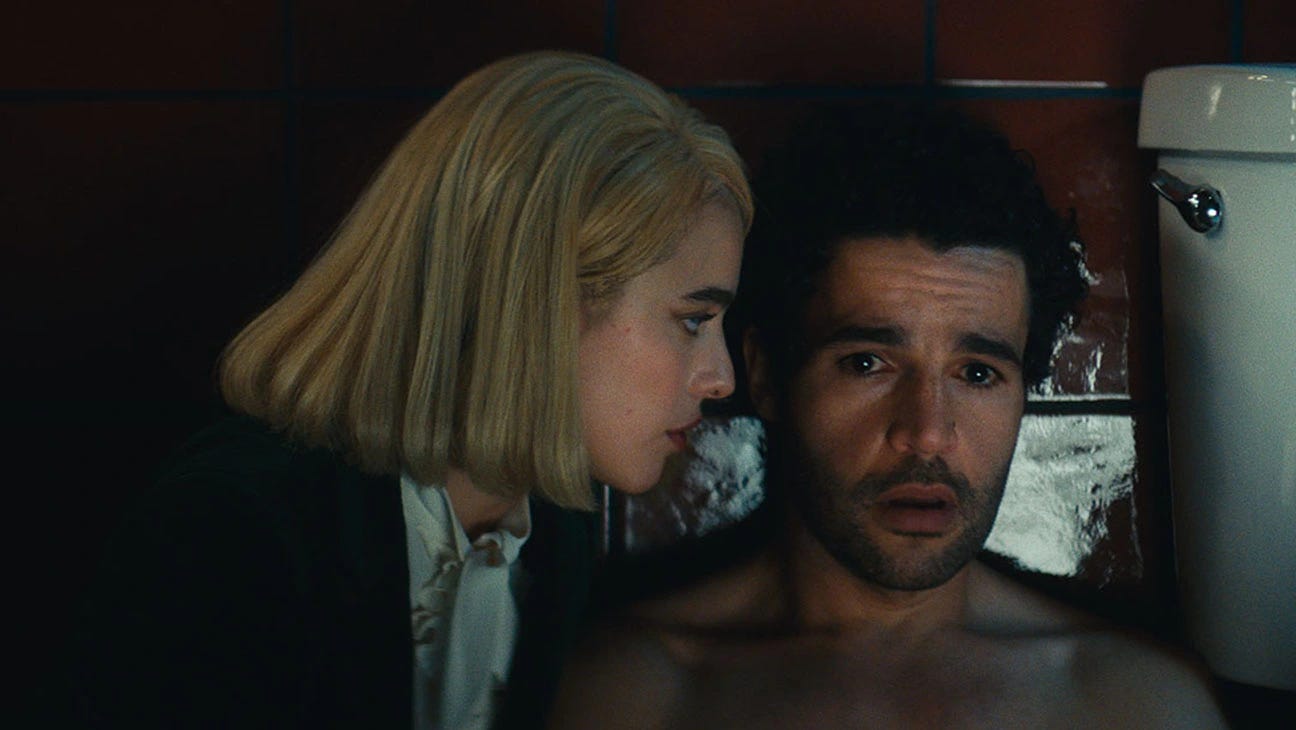
In Theaters: The Two People In A Room genre is always a dicey one to pull off, if only because we tend to watch movies to get out of a room and be taken somewhere else. But there’s been a fair amount of them lately – call it Pandemic Pragmatism – and they all seem to fall into the sub-genre of Two People In A Hotel Room: “Good Luck to You, Leo Grande” (2022), with Emma Thompson and Daryl McCormack; “3,000 Years of Longing” (2022), with Tilda Swinton and a big, bad genie played by Idris Elba; and now “Sanctuary” (in theaters, ⭐ ⭐ ⭐), which casts Christopher Abbott as Hal, a wealthy but rather dejected young man, and Margaret Qualley as Rebecca, a dominatrix for hire. It’s a love story, sort of, and whatever limitations are set by the location are obliterated by the performances.
(There was also 2021’s “Together,” with James McAvoy and Sharon Horgan – Two People In A House, a genre inaugurated by “Sleuth” in 1972 – and let’s not forget the Two People In A Restaurant variant, pioneered by “My Dinner With Andre” (1981) and too rarely followed up on.)
Abbott is generically handsome in a discount-Paul Rudd way, but he’s sneakily talented, too: In the very creepy “Possessor” (2020), directed by Brandon Cronenberg (son of David), Abbott conveyed not only his character but another character living inside his character. (It’s complicated.) And Qualley has been making choices since her breakthrough as a Manson brat in “Once Upon a Time … in Hollywood” (2019) that have her poised to be a bigger, bolder star than her mother, Andie MacDowell: The 2021 mini-series “Maid” on Netflix, a nervy turn as a headstrong journalist in Central American hot water in Claire Denis’ “Stars At Noon” (2022). “Sanctuary” lets these two actors play mind games with each other’s characters while director Zachary Wigon and screenwriter Micah Bloomberg play mind games with us.
Hal is the son of a recently deceased hotel tycoon and is poised to assume control of the company. (Or is he?) Rebecca has had enough sessions making Hal grovel and clean the bathroom floor with a toothbrush to think she’s earned a piece of the pie – half his first year’s salary, maybe, or a position high up in the corporation. “Sanctuary” plays a little like an entire season of “Succession” compressed down to 96 minutes, with narrative switchbacks, feints, ultimatums, kink, threats of violence, and something a little like love. The filmmakers are smart enough to never leave that room, because they know that letting any air in from outside would make the whole hothouse duel of wills looks silly. That it doesn’t is a tribute to the surprises the script keeps popping, to the smart but not too showy camerawork, to a score that follows this relationship through several different musical styles, and, above all, to the acting – Qualley in particular is astounding. Plus it's nice to see a movie in this terrified age that’s not afraid of its own sexuality. “Sanctuary” isn’t quite as committed to the pleasures of transgression as “Secretary,” the James Spader/Maggie Gyllenhaal S&M office romance from 2002, but the two films would make a nice, hot, rhyming double bill for a date with the dom or sub in your life.
(If nothing else, “Sanctuary” will fit nicely into the confines of your TV when it comes to VOD. I’ll let you know when that happens.)
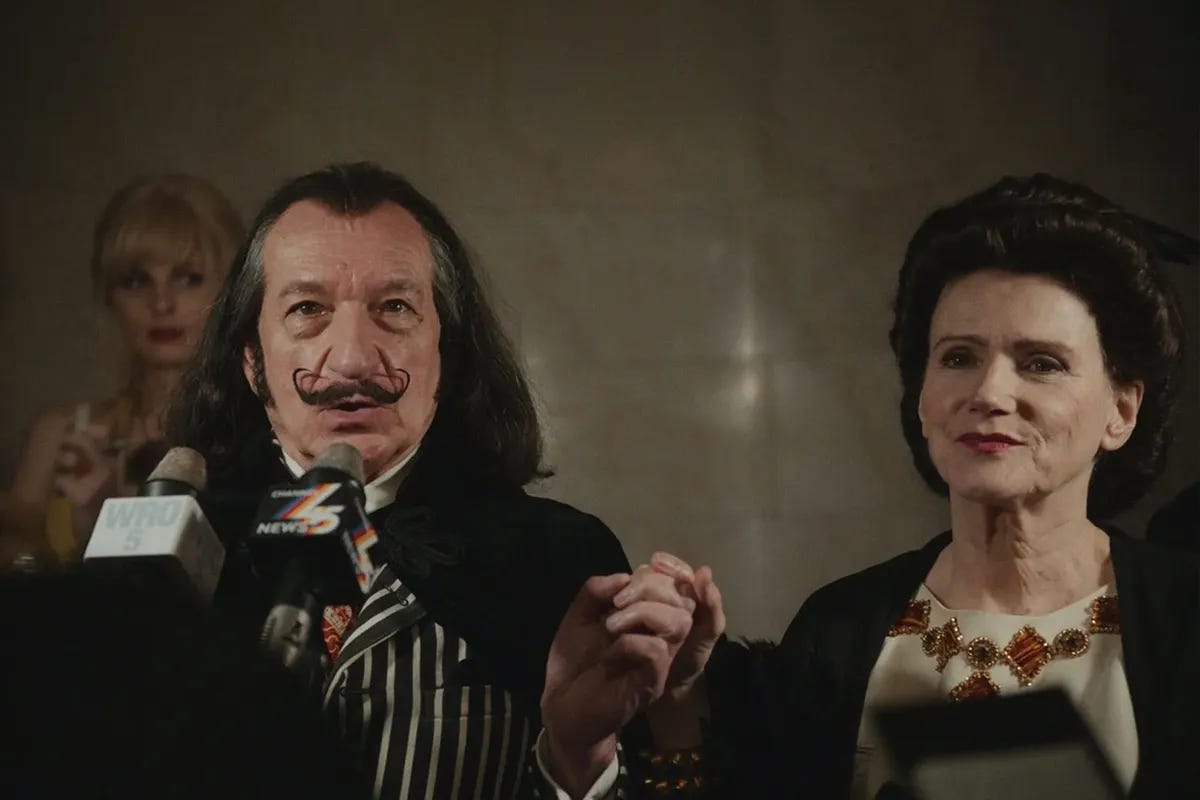
New On Demand: “Daliland” (in theaters and streaming on Microsoft, Redbox, and elsewhere, ⭐ ⭐) is further proof, if you need it, of how hard it is to make a good film about a great artist – or even Salvador Dalí. The director is the redoubtable Mary Harron, who knows how to make movies about Manhattan-based monsters (“I Shot Andy Warhol,” 1996; “American Psycho,” 2000), and the aging Dalí here, captured in his desperate early-1970s demimonde, qualifies as such. A script without a lot of urgency and a leading man with even less – Christopher Briney as a pallid young gallery assistant pulled into the Dalí party/art salon whirlwind – eventually slow the movie to a crawl, but – and it’s a big but, to quote Pee-wee Herman – you get to watch Ben Kingsley swan around with a paste-on mustache and a crackpot accent as Dalí, saying things like “Dalí abhors spinach. Dalí can only eat food with well-defined shapes that the mind can clearly grasp, like oysters.” Or this one: “I, Dalí, will build the ultimate penis to relieve the world of its anxiety. It will circle the planet. And when it is finished, it will ejaculate over the United Nations — my contribution to world peace.” And you get to watch the great German actress Barbara Sukowa (“Berlin Alexanderplatz,” “Rosa Luxembourg,” “Hannah Arendt”) play Gala Dalí, the artist’s muse and tormentor, at just about the same pitch of googly-eyed self-absorption. Believe me, these are two actors who know how to slice ham, so proceed with caution and maybe a stiff drink — but proceed.
Briefly, “Flamin’ Hot” (streaming on Disney+ and Hulu) is yet another entry in the new Heroes of Capitalism genre, or How a Consumer Brand Came To Be. This time it’s the true story of Richard Montañez, a janitor at a Frito-Lay plant in the 1980s, who invented Flamin’ Hot Cheetos and the entire Hispanic snack food market. Problem: It’s not actually true at all, as a 2021 Los Angeles Times investigation made clear. Montañez did rise from cleaning floors to become a Frito-Lay marketing executive, but he had nothing to do with the development of Flamin’ Hot Cheetos. Which means the feel-good scenes of the hero (Jesse Garcia), his wife (Annie Gonzalez), and their kids cooking up test-kitchen chili chips at home are pure hokum. It’s a shame, because the early scenes of “Flamin’ Hot,” before the boiler-plate inspirational speeches kick in, are brutally honest about what it’s like to grow up Mexican in America, the performances are excellent, and director Eva Longoria brings it in with humor and flair. But we’re being sold something as fact that didn’t really happen, and that bumps what might have been a ⭐ ⭐ 1/2 movie down to ⭐. Audiences tend to like their underdog stories to have some grain of truth to them. The wholesale fibs we leave to the Congressmen.
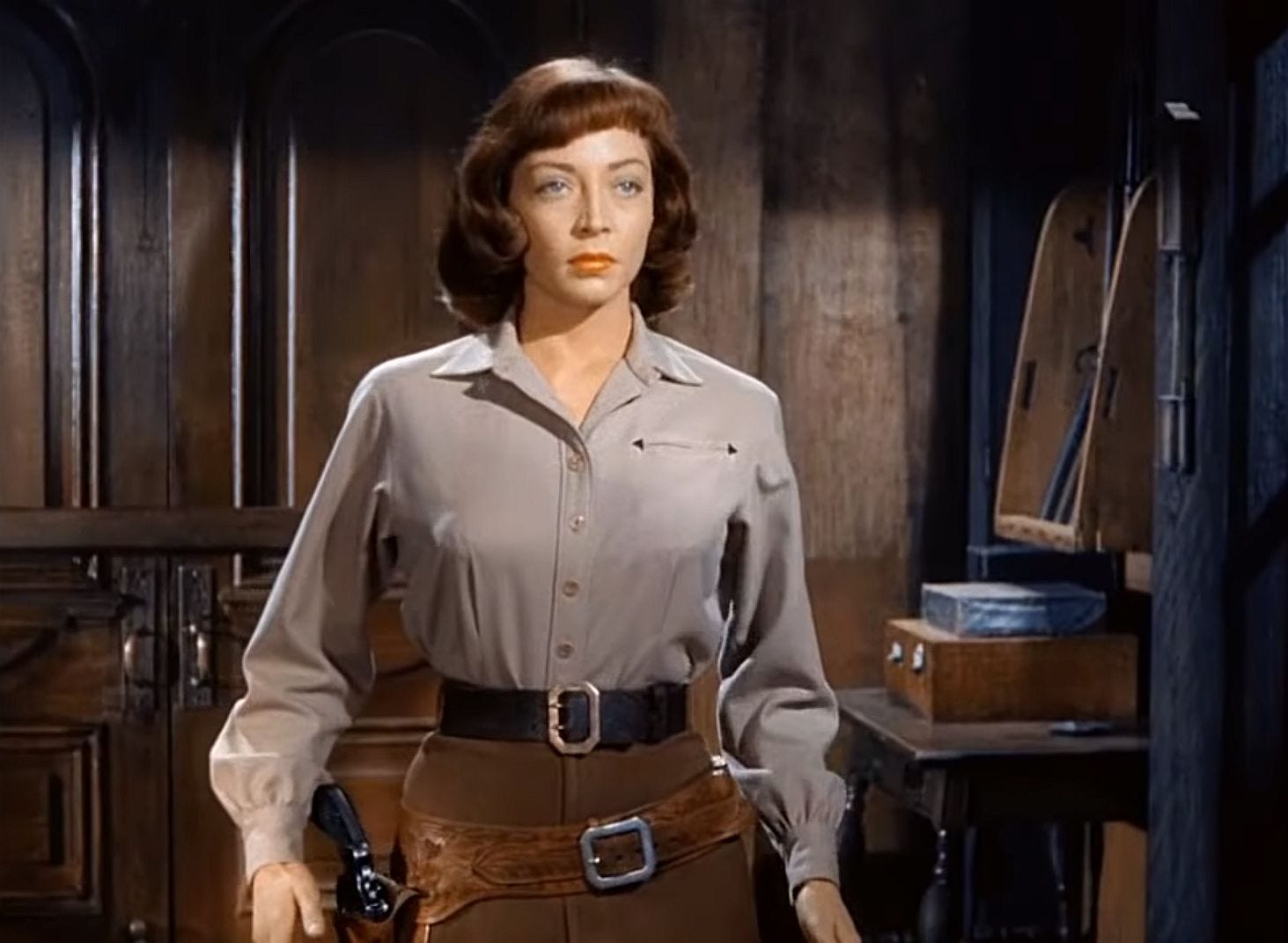
Two excellent repertory choices kick-off this weekend, one online, the other in real space. The Film Foundation, the non-profit organization founded by Martin Scorsese in 1990 to preserve and protect motion picture history, hosts monthly digital screenings of restored classics, often obscure and always worthwhile. Starting Saturday, June 10, at 7 p.m. local time and continuing for a three-day online window is a double-bill of two late-1940s B-films from Republic Pictures, the king of the Poverty Row studios. (The two were originally shown at the Museum of Modern Art in 2018 as part of the series “Martin Scorsese Presents Republic Rediscovered: New Restorations from Paramount Pictures.”) “Hellfire” (1949) is a lurid Christian Western (no, really) starring hard-boiled, bug-eyed Marie Windsor (above), usually seen destroying men in black-and-white but here presented in Republic’s patented TruColor process, gorgeously restored. “Wake of the Red Witch” (1948) was a big-budget gamble for Republic that paid off and that features wonky use of flashbacks, John Wayne wrestling a giant octopus, and a climactic image of Wayne that is, per the Film Foundation website, “impossible to forget.” Okay, I’m hooked, and if you are too, register to stream the films for 72 hours starting Saturday night and/or log on to the FF’s screening room on Monday, June 12, at 7 p.m. Eastern for a live screening with commentary.
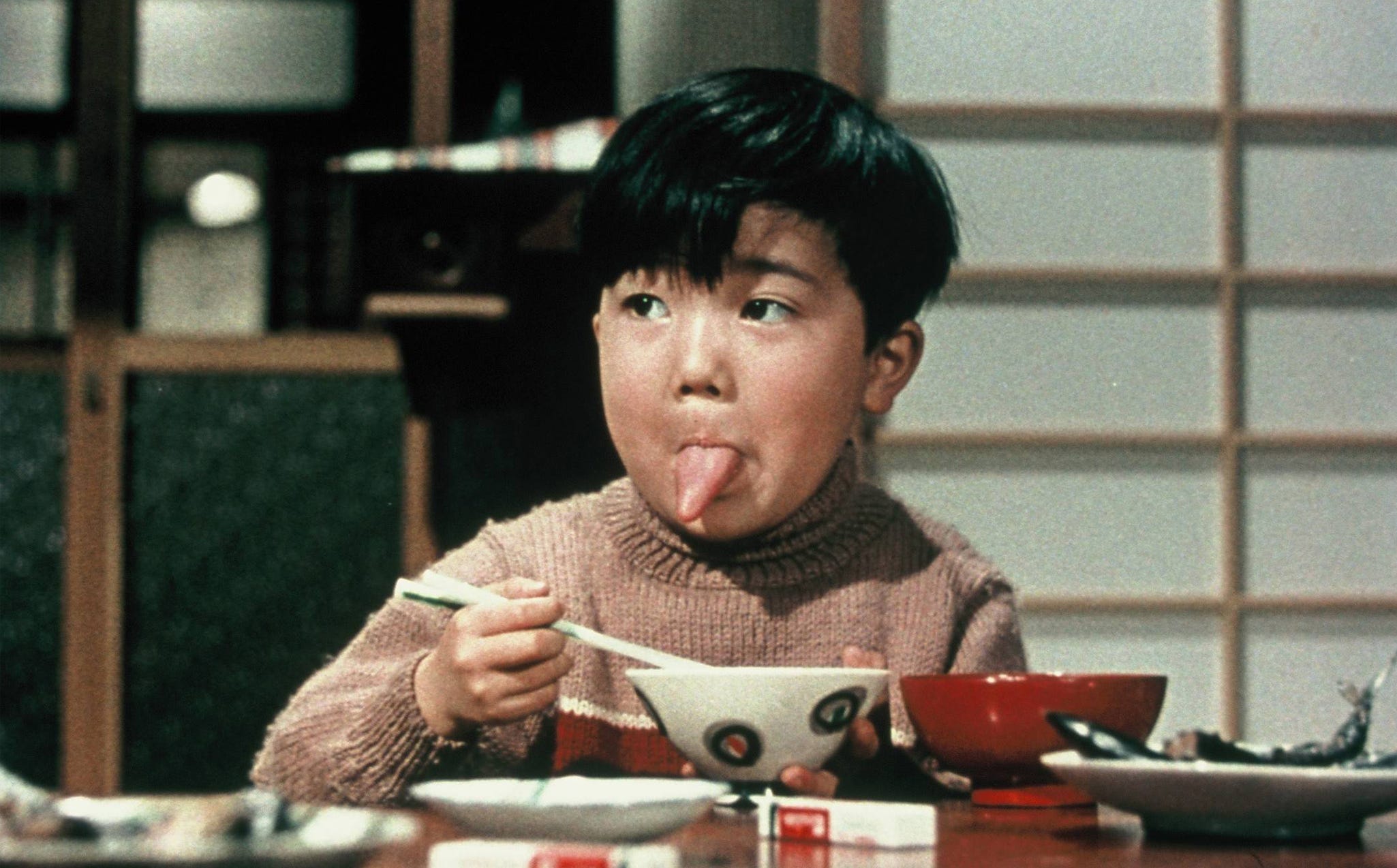
If you’re in the Boston area anytime this summer (or in New York in June through the rest of the month; see below), you must, must, must make time for the Harvard Film Archive’s retrospective series “Ozu 120: The Complete Ozu Yasujiro,” which puts all 36 of the director’s surviving films up on the big screen, including five new 35mm prints that will go into the HFA’s permanent collection (and, if they can get it over from Japan in time, a just-discovered longer version of “A Straightforward Boy,” Ozu’s 1929 silent adaptation of O. Henry’s “The Ransom of Red Chief”). Ozu, as longtime Watch List readers may know, is not only one of the greatest directors in the history of the cinema but, hands down, this critic’s favorite filmmaker – a master of rich, contemplative humanism whose films range from the bleakest of dramas (“Woman of Tokyo,” 1933) to the most profoundly hilarious of comedies (”Good Morning,” 1959, above), with infinite stops between. The series kicks off with the two Ozus most people are familiar with: “Tokyo Story” (1953; June 10th and other dates), a perennial on All-Time Best Movie lists, and “Late Spring” (1949; June 9th and 11th), a gentle heartbreaker that has been rising in critical estimation over the past few decades; it’s probably my single favorite of the director’s films. Other recommendations: “Good Morning” (July 8th and 10th); the traveling-actors period comedy “Floating Weeds” (1958; July 7th and 16th); the sly portrait of marriage “The Flavor of Green Tea Over Rice” (1952, June 23rd). But it’s hard to go wrong, especially once you get into the serene authority of the post-war filmography. (That said, the director’s rarely seen silent films show him trying his hand at all sorts of genres — college comedies, gangster films — while developing his unique personal style.) As I’ve noted in earlier posts, Ozu could be and has been accused of making the same movie over and over, but only in the way that Monet painted the same cathedral: Each one is different, each is itself, each is all of the others.
(Not to knock the HFA, but the Ozu series will also be playing at New York’s Film Forum, the whole thing squished into the month of June. And if you’re not able to make it to Boston or New York, you might want to program your own version of The Compleat Ozu, since all the films but two are streaming on The Criterion Channel, with the better-known ones on Max as well. I’m working my way through the whole kit and kaboodle chronologically as a summer tonic, but you do you.)
Here’s that 1987 Paramount photo again, this time with a who’s who.
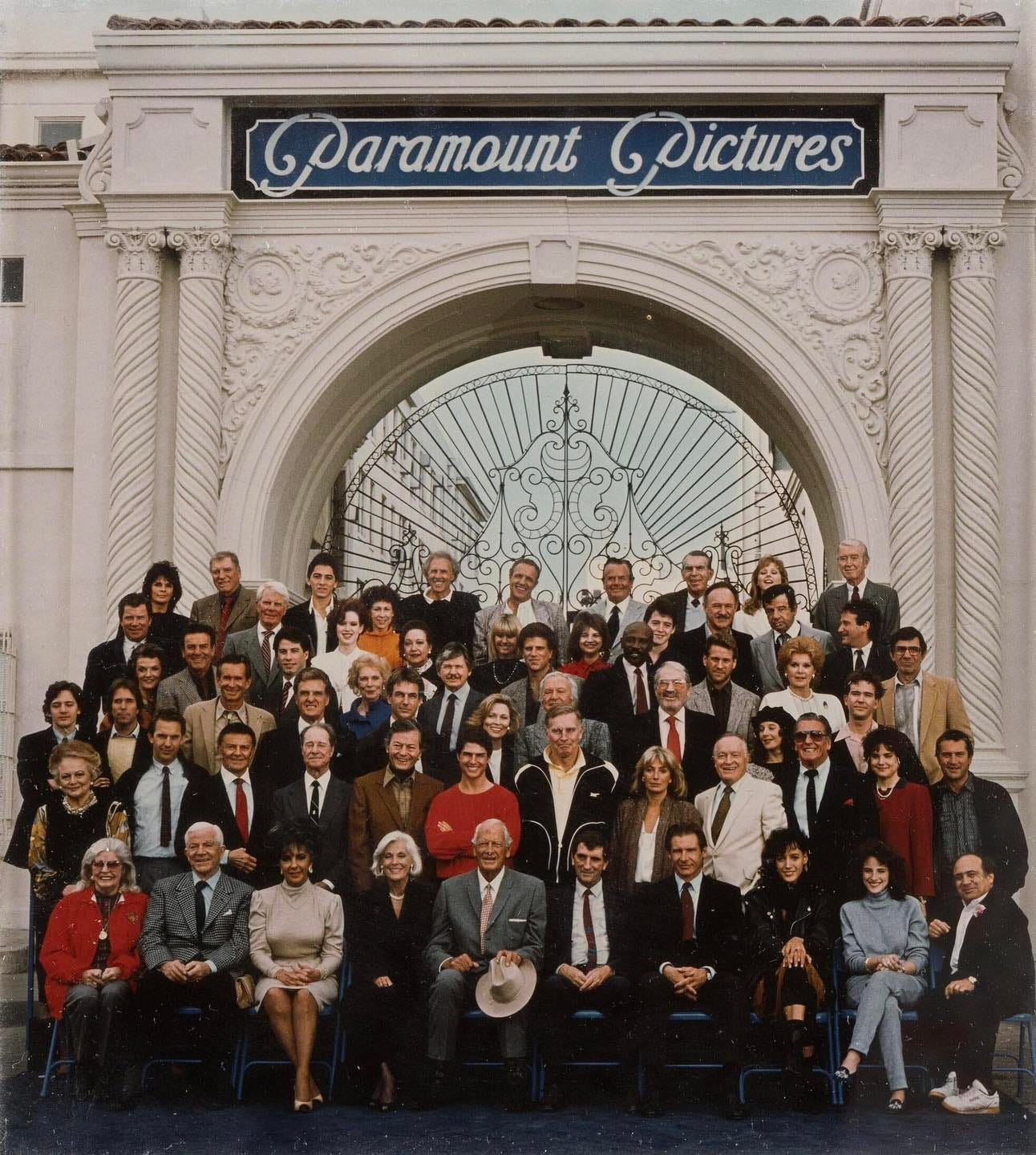
From left to right - front row - Martha Raye, Dana Andrews, Elizabeth Taylor, Frances Dee, Joel McCrea, Harry Dean Stanton, Harrison Ford, Jennifer Beals, Marlee Matlin, Danny de Vito.
Second row - Olivia de Havilland, Kevin Costner, Cornel Wilde, Don Ameche, Deforest Kelley, Tom Cruise, Charlton Heston, Penny Marshall, Bob Hope, Victor Mature, Elizabeth McGovern, Robert de Niro.
Third row - Andrew McCarthy, Henry Winkler, Anthony Perkins, Robert Stack, Mark Harmon, Faye Dunaway, Buddy Rogers, Gregory Peck, Debra Winger, Timothy Hutton.
Fourth row - Jane Russell, Mike Connors, John Travolta, Janet Leigh, Charles Bronson, Ted Danson, Lou Gossett Jnr, Ryan O’Neal, Rhonda Fleming, Leonard Nimoy.
Fifth row - William Shatner, Peter Graves, Molly Ringwald, Dorothy Lamour, Olivia Newton-John, Cindy Williams, Matthew Broderick, Gene Hackman, Walter Matthau, Robin Williams.
Back row - Ali MacGraw, Burt Lancaster, Scott Baio, Rhea Perlman, Bruce Dern, James Caan, Glenn Ford, Fred MacMurray, Shelley Long, James Stewart.
Photo by Terry O'Neill.
Enjoy your weekend and don’t hesitate to weigh in with any thoughts, stray or otherwise.
If you enjoyed this edition of Ty Burr’s Watch List, feel free to pass it along to others.
If you’re not a paying subscriber and would like to sign up for additional postings and to join the discussions — or just help underwrite this enterprise, for which the author would be very grateful — here’s how.


